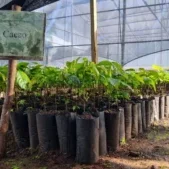
Turning Waste into Wealth: Circular Economy Opportunities in Ethiopia
Ethiopia’s rapid urbanization and economic growth have brought with them a significant rise in waste generation. Today, the country produces over 6 million tons of municipal solid waste annually, a figure projected to reach 10 million by 2030. With only 40% of waste collected and a mere 4% recycled, there is urgent need—and enormous potential—for innovative waste valorization solutions.
Ethiopia’s key waste streams include organic household waste, agricultural residues, plastics, e-waste, and industrial by-products. In cities like Addis Ababa and Bahir Dar, organic waste dominates, while plastic waste remains a growing concern across urban centers. Agricultural areas also produce millions of tons of crop residues annually. These underutilized resources represent an untapped opportunity to build a thriving circular economy that benefits the environment, economy, and public health.

Waste streams in Ethiopia
–> Download Waste Economy Factsheet <–
Circular Business Opportunities
Ethiopia’s waste economy offers a broad range of opportunities for companies committed to sustainability and innovation. Compost and fertilizer production from organic waste is particularly promising, especially in light of the country’s heavy reliance on imported chemical fertilizers. Recycling of plastics, paper, and e-waste offers high potential for import substitution—up to USD 500 million annually in the case of plastics alone.
TRAIDE’s Circular Economy Initiatives
TRAIDE is actively working to unlock the potential of Ethiopia’s waste economy through several targeted initiatives:
- Black Soldier Fly Farming: In partnership with local and international actors, TRAIDE has supported piloting of black soldier fly farming in Ethiopia. This model transforms organic waste into high-quality insect protein for animal feed and organic fertilizer, reducing landfill pressure and offering a sustainable input for agriculture.
- Plastic Recycling Innovation: TRAIDE has helped to build a partnership between an Ethiopian and Dutch business to transform plastic drinking cups into food-grade packaging materials. This model helps address urban plastic pollution while developing locally produced alternatives to imported packaging.
- Organic Fertilizer Production: TRAIDE has built a business case for using biodigesters to convert chicken manure and malting waste into liquid fertilizer and pellets. This initiative supports sustainable farming practices and helps reduce reliance on imported synthetic fertilizers.
- Avocado Waste Valorization: Ethiopia’s avocado processing industry generates significant waste. TRAIDE is exploring ways to extract valuable resources from this by-product—such as protein for animal feed, biochar, organic fertilizer, or briquettes for clean cooking.
Partner with Us
TRAIDE welcomes collaboration with companies, investors, and innovators seeking to build scalable, sustainable solutions for the circular economy. Reach out to us at ethiopia@traide.org.









